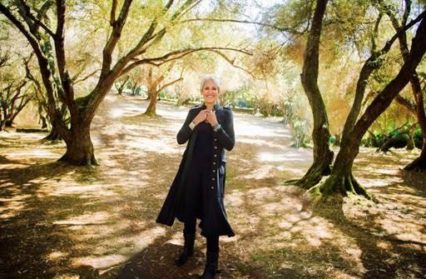Ahead of her performance at St David’s Hall on Saturday 23rd February 2019, Paul Chambers takes a brief look back at the career of Joan Baez.
“I have to reinvent.” So declared Joan Baez on the eve of the launch of her latest album, Whistle Down the Wind. Baez likens the album, her first in 10 years, to her earliest records, put out at the dawn on the 1960s folk music revival. The album’s combination of “very socially conscious songs” and “pure ballads, songs that are just beautiful and aren’t trying to tell anybody anything,” stand as a fitting and reflective testimony to one the twentieth century’s great musical interpreters.
 Baez, now 78, didn’t write any of the songs on the record, instead curating material on the basis of songs by other artists that she felt spoke to her on some deeper, emotional level. The album’s song writing credits include such composers as Tom Waits, Josh Ritter and Mary Chapin Carpenter, alongside lesser-known roots songwriters like Zoe Mulford, Tim Eriksen, and Eliza Gilkyson. The result is a thoughtful and, at times, defiant portrait of an artist coming to terms with her own necessity for reinvention against the backdrop of rapidly changing times.
Baez, now 78, didn’t write any of the songs on the record, instead curating material on the basis of songs by other artists that she felt spoke to her on some deeper, emotional level. The album’s song writing credits include such composers as Tom Waits, Josh Ritter and Mary Chapin Carpenter, alongside lesser-known roots songwriters like Zoe Mulford, Tim Eriksen, and Eliza Gilkyson. The result is a thoughtful and, at times, defiant portrait of an artist coming to terms with her own necessity for reinvention against the backdrop of rapidly changing times.
Although regarded primarily as a folk singer, Baez’s music has broadened considerably since the counter-culture era of the 1960s, and this diversification is evident once more on Whistle Down the Wind. Her body of recorded material stands as testament to a restless creative energy, and now encompasses genres such as folk-rock, pop, country, and gospel. She has even recorded songs in six other languages.
It is precisely this range of styles and interpretations of material that audiences stand to expect at Baez’s performance at St David’s Hall on Saturday 23 February. The Fare Thee Well tour is, perhaps, the iconic singer-songwriter’s final, formal outing as a live performer. And, at this bookend of engagements, the performance in Cardiff will serve as a fitting view point from which to measure and asses her astonishing career.
Alongside her music, Joan Baez has been as equally engaged in championing social and civil rights. She marched on the front lines with Martin Luther King, inspired Václav Havel to fight for a Czech Republic, and went to jail for 11 days for participating in a sit-in at a military induction centre. Alongside her Recording Academy’s Lifetime Achievement Award, Baez is also a recipient of Amnesty International’s Ambassador of Conscience Award.
 Despite finding herself artistically adrift in the more apolitical period of the 1980s, Baez continues to fight for the causes she embraces, with the same conviction and energy she has poured into combating social and environmental inequality since she first achieved fame, some six decades ago.
Despite finding herself artistically adrift in the more apolitical period of the 1980s, Baez continues to fight for the causes she embraces, with the same conviction and energy she has poured into combating social and environmental inequality since she first achieved fame, some six decades ago.
Whistle Down the Wind serves a poignant, often moving, reflection of the artist, both in terms of her life as a musician and as a social activist. Although her pristine soprano may not be quite the otherworldly power it once was (forcing her to develop “a new range and a new way of expressing myself”), Joan Baez’s artistic voice remains as committed and defiant as ever. Her performance in Cardiff later this month, a stop on the final leg of her formal touring career, promises to be a fitting opportunity for admirers of her music, as well as her activism, to pay tribute to one of popular music’s greatest social consciences. At least for now.
Tickets for St David’s Hall are on sale now from here.












